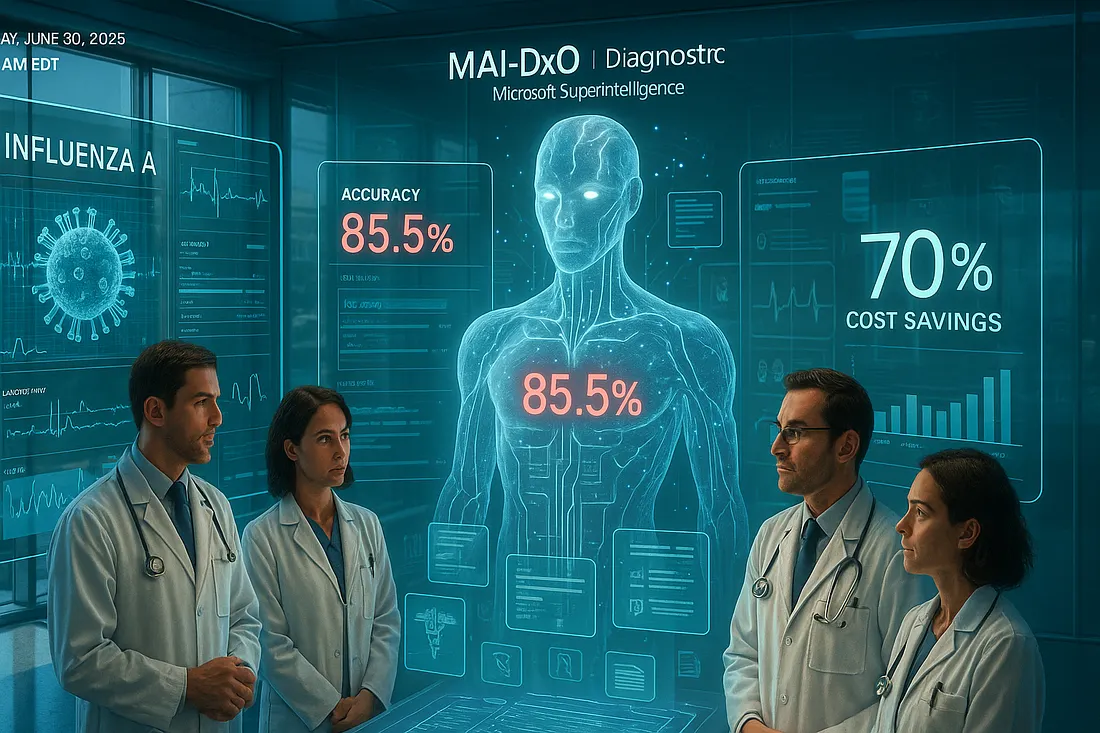Microsoft’s AI Diagnostic Orchestrator: Revolutionizing Patient Diagnosis
 CC: Check Here
CC: Check Here
The integration of artificial intelligence (AI) into healthcare has opened new avenues for patient diagnosis and treatment. Among the frontrunners in this field is Microsoft, which recently announced that its new AI system, the Microsoft AI Diagnostic Orchestrator (MAI-DxO), can diagnose patients with an accuracy four times greater than that of human doctors. This groundbreaking technology not only promises to enhance diagnostic accuracy but also aims to significantly reduce healthcare costs.
Table of Contents
- Introduction
- The Development of MAI-DxO
- How MAI-DxO Works
- Performance Metrics
- Impact on Healthcare
- Challenges and Ethical Considerations
- Conclusion
Introduction
As healthcare systems worldwide struggle with increasing patient loads and resource constraints, innovative solutions are urgently needed. The need for more accurate and efficient diagnostic tools has become paramount. Microsoft’s MAI-DxO emerges as a potential game-changer, leveraging AI's capabilities to analyze complex medical cases with unprecedented precision.
"Microsoft's AI tool can diagnose disease four times more accurately than a panel of human physicians." – WIRED
The Development of MAI-DxO
Microsoft’s journey in developing the MAI-DxO involved collaboration with leading experts and researchers in the field of AI and healthcare. The company's AI research team undertook extensive studies, benchmarking the diagnostic abilities of MAI-DxO against seasoned physicians in the U.S. and the U.K.
- Key Features of MAI-DxO:
- Integration of Multiple AI Models: MAI-DxO uses a combination of various AI models to enhance its diagnostic capabilities.
- Focus on Complex Cases: The system is designed to tackle intricate medical conditions, often challenging for human doctors to diagnose accurately.
- Cost-effective Diagnosis: By streamlining diagnostic processes, MAI-DxO aims to reduce overall costs associated with patient diagnosis.
How MAI-DxO Works
The core functionality of MAI-DxO revolves around its ability to analyze medical data and case studies from reputable sources, such as the New England Journal of Medicine (NEJM).
Sequential Diagnosis Benchmark (SD Bench)
To evaluate MAI-DxO's effectiveness, Microsoft developed the Sequential Diagnosis Benchmark (SD Bench). This benchmark transforms 304 recent NEJM cases into stepwise diagnostic encounters, allowing the AI to navigate complex diagnostic challenges similarly to human physicians.
- Stepwise Reasoning: MAI-DxO mimics the diagnostic reasoning process, engaging in a debate-like approach to reach conclusions.
- Data Training: The AI system learns from extensive medical literature and real-world case studies, continually improving its accuracy.
Performance Metrics
The capabilities of MAI-DxO have been rigorously tested and validated. According to Microsoft, the AI system achieved an impressive 85% accuracy rate in diagnosing complex medical cases—a significant leap from the diagnostic accuracy typically seen in experienced human doctors, which hovers around 20%.
- Comparison of Diagnostic Accuracy:
- MAI-DxO: 85%
- Human Doctors: 20%
This dramatic increase in diagnostic accuracy showcases the potential of AI in enhancing patient care.
Impact on Healthcare
The introduction of MAI-DxO presents several implications for the healthcare sector:
Improved Patient Outcomes
With the ability to diagnose conditions more accurately, MAI-DxO can help healthcare providers offer timely and effective treatments, leading to better patient outcomes.
Cost Reduction
By minimizing the need for unnecessary tests and consultations, MAI-DxO has the potential to lower healthcare costs significantly. This is particularly beneficial in systems where resources are stretched thin.
Scalability
AI systems like MAI-DxO can be scaled more easily than human resources, allowing healthcare systems to manage larger patient volumes without compromising the quality of care.
Challenges and Ethical Considerations
Despite the promising capabilities of MAI-DxO, several challenges and ethical considerations must be addressed:
- Data Privacy: The use of patient data to train AI systems raises concerns about privacy and data security.
- Accountability: In cases of misdiagnosis, determining accountability—whether it lies with the AI or the healthcare provider—poses legal and ethical dilemmas.
- Bias in AI: AI systems can inherit biases present in the data they are trained on, leading to disparities in care for different demographic groups.
Conclusion
Microsoft’s AI Diagnostic Orchestrator represents a significant advancement in the use of artificial intelligence in healthcare. With its ability to diagnose patients with remarkable accuracy and cost-effectiveness, MAI-DxO has the potential to reshape the landscape of medical diagnostics.
As the healthcare industry continues to evolve, embracing AI technologies like MAI-DxO could lead to improved patient outcomes, reduced costs, and enhanced efficiency. However, it is essential to navigate the associated challenges carefully to ensure that these advancements benefit all patients equitably.
In a world where technology and healthcare converge, Microsoft's MAI-DxO stands at the forefront, heralding a new era in the quest for accurate and timely diagnosis..

